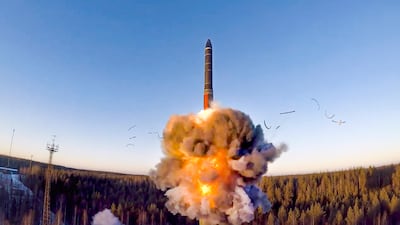Britain needs to invest in new missile defences to protect civilians and key installations from Russian attack as part of its new strategy review, military analysts have told The National.
The British army also needs to introduce more realistic training exercises with a greater disregard for safety concerns to ensure it is better trained for war.
Following Ukraine invasion new Prime Minister Liz Truss has ordered an urgent re-examination of the defence strategy called the Integrated Review published by Boris Johnson’s government in March 2021.
While the review referred to Russia as the main threat, it was published before the aggressive build-up of forces on Ukraine’s border that was followed by an all-out invasion.
With the war being conducted along much more conventional lines, with tanks, artillery and infantry to the fore, experts say a rapid rethink is required for the West’s previous mindset of high-tech warfare.
The new strategy should include much greater attention to protecting Britain from a potential Russian missile strike, said retired Colonel Hamish de Breton Gordon.
“Attacking the civilian population as a way to defeat a country is what happened in Syria and is now happening in Ukraine,” he said.
“Putin has realised that conventionally not only his troops and equipment is rubbish but they're getting hammered by a much smaller force so he has to resort to the unconventional warfare, attacking hospitals or nuclear power plants.
“The UK’s review really needs to reflect what we're seeing in Ukraine at the moment and how would we cope with this type of warfare.”
Ukraine’s experience also means that the military might develop more sophisticated artillery, something that has been neglected for decades.
Using long-range French, US and British artillery, the Ukrainians have been able to out-gun Russia’s cannons and with much greater accuracy.
“There should now be much greater focus on precision artillery coupled with intelligence,” said Mr de Breton Gordon, who commanded Britain’s chemical and nuclear defence forces.

This would also mean greater deployment of drones and other intelligence systems to seek out the enemy.
The new review needs to clearly label Russia as the main enemy as there was now a significant risk of war with Britain, said Sam Cranny-Evans of the RUSI think tank.
“Things have changed and the threats have become more immediate,” he told The National.
“We have seen that in Operation Mobilise where the army has been told you need to get ready to fight Russia.
“This was done in no uncertain terms, which is a really important step because since 2014 we’ve labelled Russia merely as 'competition' which is ridiculous.”
The government should give the military “a period of stability and support” to absorb the reforms in the most recent Integrated Review, published 18 months ago.
He also called for the review to bring in “greater interoperability” between national defences.
“For example, if a cruise missile was launched at Britain from the Russian enclave of Kaliningrad it would be picked up by Polish radar and then Dutch radar which would give the UK time to launch a Typhoon fighter to shoot it down.”
He also called for “higher levels of training readiness” with less focus on health and safety, as people get hurt in war.
“They are not even allowed to practice digging trenches on Salisbury Plain [training area] and trenches have proven to save countless lives in Ukraine,” he added.
With the attacks and threat to the Zaporizhzhia nuclear power station in Ukraine, it has become clear that hostile states could be willing to use what Mr de Breton Gordon termed an “improvised nuclear device”, by using missile attacks to cause a mass radiation fallout.
Britain, and other European countries with nuclear power, should consider stationing better defences such as the US-made Terminal High Altitude Area Defence that was used successfully against an attack on the UAE in January intercepting an Iran-supplied missile.
“You don't need a nuclear weapon, you just need the person you're attacking to have nuclear power to have as dramatic an effect,” he said.
The updated review is expected to completed by the end of this year.


